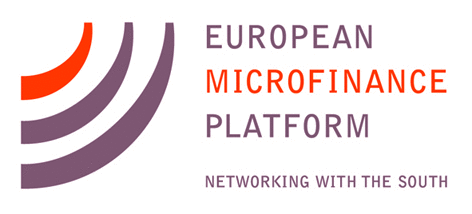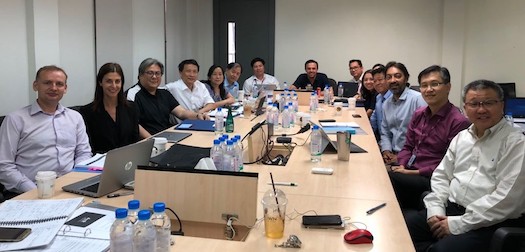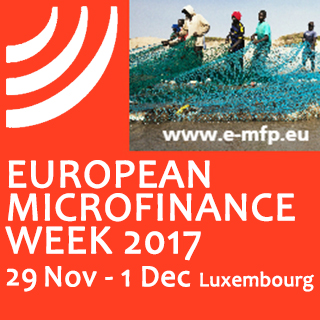This conference will focus on “transparency, regulations, transformation of [the] microfinance industry, social reporting standards, investment, risk and asset management, and innovation” in the Central and Western Asia. Sessions will cover topics including
Category: Transparency
MICROFINANCE EVENT: Africa Global Payment Summit; August 27 – 28, 2019; Johannesburg, South Africa
The 2019 Africa Global Payment Summit will cover “developments in payments and wallets as well as the larger, cross-border regional platforms that are transforming the African payments landscape.” Sessions with address regulatory best practices, bringing together the 16 central banks of the Southern African Development Community to identify what an enhanced global payment system for the region
MICROFINANCE EVENT: Business Fights Poverty; July 11, 2019; Oxford, England
Event Summary: This event will cover ways to “embed purpose authentically within business,” which the organizer describes as incorporating societal objectives within organizational goals.
MICROCAPITAL BRIEF: MASLOC Halves Interest Rates to 12% as Bank of Ghana Starts $172m Bailout of Microfinance Industry
The Ghanaian government’s Microfinance and Small Loans Centre (MASLOC), a provider of retail and wholesale microcredit, recently received approval to cut its annual interest rate from 24 percent to 12 percent. Meanwhile, the institution has received GHC 75 million (USD 14 million) from the government to expand its operations. This expansion includes a plan to have offices in 70 percent of the nation’s districts by the end of 2019 and
MICROCAPITAL BRIEF: NpM Unveils Database of Funders of Agtech (Agricultural Technology) in Africa, Asia
NpM, formerly known as the Netherlands Platform for Microfinance, recently rolled out a database of approximately 200 funders of agricultural technology (agtech) in Africa and Asia. Users can filter the funds by factors including
MICROCAPITAL BRIEF: Global Impact Investment Network (GIIN) Updates IRIS to IRIS+ Impact Measurement, Management System
The Global Impact Investment Network (GIIN), a US-based nonprofit association of investors, asset managers and other financial institutions with an interest in impact investing, recently announced the launch of its Impact Reporting and Investment Standards Plus (IRIS+). The aim of IRIS+ is to provide a framework to “identify, measure and manage the social and environmental impact of investors’ actions and report their impact to a wider audience in a consistent and standard way” as well as provide investors with “impact data” that can inform their investment decisions. This impact data includes metrics relating to topics such as gender equality, affordable housing and minimizing climate change.
The predecessor to IRIS+, the Impact Reporting and Investment Standards Catalog of Metrics
MICROCAPITAL BRIEF: EDFI to Harmonize Measurement of Development Finance Institutions’ Impact Toward UN Sustainable Development Goals
EDFI, a Belgium-based association of 15 European development finance institutions (DFIs), recently announced the launch of an initiative to “deepen cooperation on… impact measurement.” As part of the effort, EDFI aims to work “towards common definitions and methods to measure impact on SDGs (sustainable development goals), with a focus on key impacts to which private sector enterprises contribute, including gender equality, job creation, reduced inequality, and fighting climate change.” The intention
MICROCAPITAL BRIEF: Microfinance Institutions (MFIs) in Nicaragua Lose $30m During Year of Political Turmoil
La Cámara de Microfinanzas, a network of 27 microfinance institutions (MFIs) in Nicaragua that is also known as ASOMIF, recently reported that its members lost USD 30 million during 2018. Among the reasons cited for the decline are the country’s political unrest that began in April 2018 and
MICROCAPITAL BRIEF: Karandaaz Unifies Data on Financial Services in Pakistan into Single Portal
An NGO named Karandaaz Pakistan recently launched a collection of data on financial services and “selected socioeconomic indicators” on
MICROCAPITAL BRIEF: Government of Ghana Restores Losses to Customers of Failed Microfinance Institutions (MFIs), but $150m of Savings Remain “in Jeopardy” in Advance of Deposit-insurance Rollout
After the collapse of approximately 100 licensed microbanks in Ghana over four years, the country’s central bank, the Bank of Ghana, has announced it will refund deposits of up to GHS 10,000 (USD 2,000) per retail
MICROFINANCE PAPER WRAP UP: “Cyber Security in Emerging Financial Markets,” Published by CGAP
This is a summary of a paper by Hildah Nduati, published by CGAP (Consultative Group to Assist the Poor), May 2018, 8 pages, available at https://www.findevgateway.org/sites/default/files/publication_files/cybersecurity_in_emerging_markets_06-30.pdf
The availability of digital financial services (DFS) has altered the way many payments are collected and processed in developing countries. Ms Nduati argues that, although DFS have helped millions of people stabilize their income and break out of their stagnant socioeconomic positions, there remain many issues outstanding
MICROFINANCE PAPER WRAP UP: “The Bali Fintech Agenda: A Blueprint for Successfully Harnessing Fintech’s Opportunities;” published by International Monetary Fund (IMF), World Bank Group
This is a summary of a paper published by the International Monetary Fund (IMF) and the World Bank Group; October 2018; 43 pages; available at:
http://www.findevgateway.org/sites/default/files/publication_files/pp101118-bali-fintech-agenda_1.pdf
The authors of this paper, whose title refers to its release at a conference in Bali, Indonesia, argue that financial technology (fintech) offers emerging markets both opportunities and risks, including risks to “financial
SPECIAL REPORT: A Model from Cambodia for Preventing Overheating – Not Just Multiple Lending; to be Presented at European Microfinance Week; November 14-16, 2018
Since  2016, the 95-member Cambodia Microfinance Association (CMA), Incofin, MIMOSA, the Credit Bureau of Cambodia, and several other stakeholders have been developing the CMA Lending Guidelines, under which microfinance institutions (MFIs) are working together to prevent over-indebtedness in Cambodia. The project is funded by Incofin, PROPARCO, BIO, FMO and ADA.
2016, the 95-member Cambodia Microfinance Association (CMA), Incofin, MIMOSA, the Credit Bureau of Cambodia, and several other stakeholders have been developing the CMA Lending Guidelines, under which microfinance institutions (MFIs) are working together to prevent over-indebtedness in Cambodia. The project is funded by Incofin, PROPARCO, BIO, FMO and ADA.
MicroCapital: How long have you been concerned about possible overheating in the Cambodian microfinance market?
Kea Borann: Concerns of the market overheating started at least as early as 2015. Since then, the total outstanding portfolio of the industry has been growing at an average of 25 percent per year, even as the number of loans has remained unchanged at 2.3 million. This seems to mean that the same clients are taking on more debt when their loans are renewed. The average loan size grew from USD 1,691 to
SPECIAL REPORT: Responsible Investment Requires Responsible Exits – Applying a Fitness and Compatibility Review Matrix to Choose an Equity Buyer for AMK Cambodia
In 2012, Incofin’s Rural Impulse Fund II (RIF II) bought a 25-percent stake in AMK, a microfinance institution in Cambodia. Six years later, RIF II exited AMK, selling its stake to Shanghai Commercial and Savings Bank (SCSB). Dina Pons, Incofin’s regional director for East Asia, shares some insights on the exit  process.
process.
IN PHOTO: The last and first meeting of AMK’s board of directors: entering and exiting members ensuring a smooth transition.
MicroCapital: Please tell us a bit about AMK’s social performance and Incofin’s contribution to it.
Dina Pons: Founded in 2003, AMK is one of the largest and most recognised finance institutions operating in rural Cambodia. It serves around 700,000 clients nationwide with a unique set of financial services, including credit, savings, money transfers and insurance. AMK’s strong customer centricity and deep focus on rural clients were among the key attractions for us to invest in the company. Since its inception, AMK’s mission has been “to help large numbers of poor people improve their livelihood options through the delivery of appropriate and viable microfinance services.” Far from being just a theoretical motto, AMK’s social mission is what drives the institution and its staff to perform. For instance, a board-level social performance committee, which I was privileged to chair for three years, was tasked with checking each year whether
MICROFINANCE PAPER WRAP-UP: “The Rise and Fall of Global Microcredit – Development, Debt and Disillusion;” Edited by Milford Bateman, Stephanie Blankenburg, Richard Kozul-Wright
This is a summary of a book edited by Milford Bateman, Stephanie Blankenburg and Richard Kozul-Wright; published by Routledge; September 2018; 290 pages; available for purchase at https://www.routledge.com/The-Rise-and-Fall-of-Global-Microcredit-Development-debt-and-disillusion/Bateman-Blankenburg-Kozul-Wright/p/book/9781138714120
The authors of this book discuss the history, concepts and adverse impacts of microfinance as it has been deployed in the Global South since the 1980s. Contrary to the intent of microcredit and associated economic policies to enable low-income people to benefit from entrepreneurship,
MICROCAPITAL BRIEF: Gentera’s FiinLab, Oikocredit, Vox Capital Buy Equity Stakes in Fintech Avante, Boosting Mobile Microfinance, POS Service for Microenterprises in Brazil
Brazilian financial technology (fintech) firm Avante recently raised an undisclosed amount of funding from FiinLab, a unit of Mexico’s Gentera Group; Oikocredit, a Dutch cooperative; and Vox Capital, a Brazilian investor in education, health and financial services. The sizes of the stakes taken by each have not been disclosed. Of the three investors, only Vox
MICROCAPITAL BRIEF: 30 Microfinance Institutions (MFIs) in Ghana Investigated for Possible Illegal Activity
Allegations of fraud and embezzlement have surfaced against roughly 30 microfinance institutions (MFIs) in Ghana. A preliminary investigation performed by the country’s Securities and Exchange Commission and the Economic and Organized Crime Office
SPECIAL REPORT: Scaling Up Implementation of Social Performance Management at European Microfinance Week
On  the first day of conference sessions at European Microfinance Week, experts in the social performance of microfinance institutions (MFIs) discussed how tools developed over the last ten years have reached a level of maturity warranting their wider rollout.
the first day of conference sessions at European Microfinance Week, experts in the social performance of microfinance institutions (MFIs) discussed how tools developed over the last ten years have reached a level of maturity warranting their wider rollout.
Cecile Lapenu of France-based Cerise described SPI4, the fourth iteration of a set of Social Performance Indicators intended to simplify reporting and provide a common language for different stakeholders to discuss social performance management (SPM). SPI4 incorporates the Smart Campaign’s Client Protection Principles and the Social Performance Task Force’s Universal Standards for SPM. It also includes optional modules on poverty, gender and the environment. To date, 432 SPI4 audits have been completed on institutions in 88 countries.
Jurgen Hammer of the Luxembourg-based Grameen Credit Agricole Foundation explained his organization’s use of the SPI4/ALINUS (Aligning Investors’ Due Diligence to the Universal Standards) framework to evaluate and benchmark the social performance of its partner MFIs. The foundation was meeting or exceeding the benchmark data in all categories except
